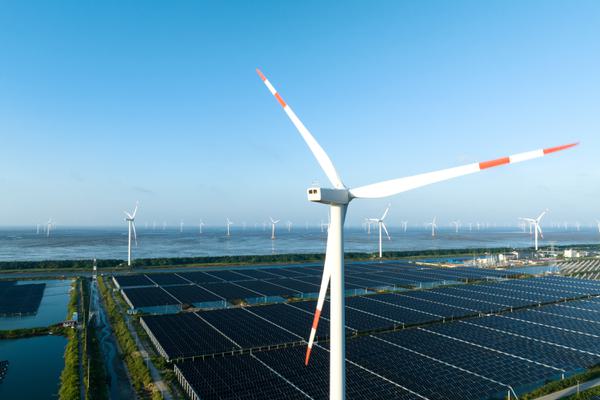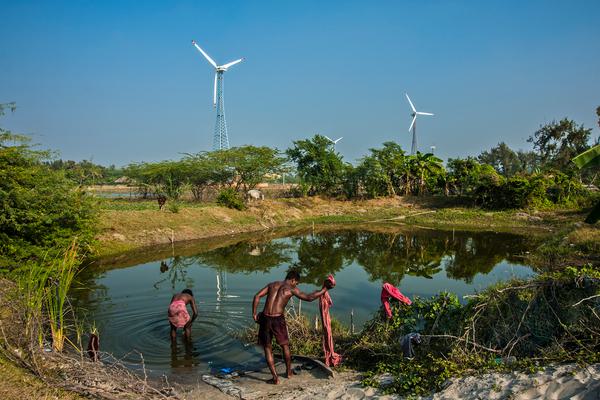Respecting the rights of Indigenous Peoples and local communities can advance the energy transition
25 September 2023

In Norway this past spring, headlines showed protesters demanding the removal of wind turbines at the state’s Fosen wind park. The renewable energy project caused disruption to the reindeer grazing grounds of the Indigenous Sámi population and was ruled by the Norwegian Supreme Court to have violated the Sámi people’s cultural rights.
Here is a critical dilemma of the energy transition. The world must quickly transition from fossil fuels to renewables. But irresponsible renewable energy projects that violate people’s rights can cascade into conflict and protest, slowing the transition, and making sustainable development strategies even more difficult to implement.
Harms to Peoples like those at the Fosen wind park are not an anomaly: over 200 allegations of human rights abuses linked to renewable energy projects were recorded between 2010 and 2021. These harms are often unnecessary for project deployment. In the case of Fosen, the Supreme Court ruled there were other non-disruptive, suitable locations for the wind park. If the Norwegian government had consulted project-affected Sami Peoples and enabled them to participate in the project screening phase, then the government could have required developers pivoted to one of these alternative locations to gain project approval.
In other instances of human rights abuses, renewable energy companies and host states to their projects have faced legal action for improper consultation with and inadequate compensation for project-affected groups, which in some cases has resulted in invalidated company land title deeds, and the return of land back to locals. Protests and blockages by people and communities have also led to the cancellation of renewable projects entirely.
The inadequate human rights policies and practices of some renewable energy companies show that depending on businesses to voluntarily respect human rights in their operations isn’t enough. Fortunately, new tools are now available to advise policymakers on addressing this challenge, including a new briefing we at the Columbia Center on Sustainable Investment (CCSI) have recently published.
The first point to stress is that in order to advance responsible business conduct, we need governments to meet their obligations to enable energy transitions that are rapid and just. That means the rights of affected Indigenous Peoples and local communities must be a central part of assessments for any new projects under development and of overarching renewable energy policies.
Upholding human rights through participatory impact assessments
Environmental, Social and/or Human Rights Impact Assessments (ESHIAs) assess the potential adverse social and environmental impacts of an investment project at early project development stages. By requiring renewable energy investments to conduct comprehensive, participatory Environmental, Social and/or Human Rights Impact Assessments (ESHIAs), host states can proactively prevent human rights abuses and mitigate associated risks by addressing site-specific impacts (including impacts on tenure and on cultural rights) before the signing of an investment agreement.
Distinct from box-ticking exercises, participatory and effective ESHIAs have mechanisms and resources to include Indigenous Peoples and local communities throughout assessments and to record their project-related concerns. This active inclusion helps avoid missing critical issues, including benefitting from local or traditional knowledge shared under Free, Prior and Informed Consent (FPIC) processes. This is particularly important where human rights protections are not formally embedded into national and local laws. For instance, legitimate tenure rights are not always recognised in national law or formally documented in national land registries, but responsible projects nonetheless respect tenure rights and all other human rights enshrined in international law.
Through these tools and methods, participatory ESHIAs help prevent rights violations, and avoid legal actions, protests, and host state reputational damage. Operating companies that carry out such assessments are less likely to face project delays or cancelations, and project benefits can be more effectively realised.
Strategic Environmental Assessments, co-equity models, and benefit sharing
To enable viable and rights-respecting projects, ESHIA requirements should be implemented alongside other policy reforms aimed at reconciling energy transition goals and human rights obligations.
Importantly, Strategic Environmental Assessments (SEAs) should be conducted, coordinated, or outsourced and reviewed by host governments. SEAs are high-level policy tools that address the general environmental implications of a proposed government plan – such as, renewable energy deployment plans – at the earliest stage of decision-making and throughout all subsequent planning stages. SEAs can promote rights protections for a host of potential investments before any are even approved.
After mitigating negative project impacts through SEAs and ESHIAs, host states can help project-affected groups advance their self-determined development goals and earn their fair share of project profits. Through investor-state contracts or legislation, states can require companies to enter into co-equity models and benefit sharing agreements with Peoples and communities.
What can global policymakers do?
Host states are not the only policymakers who need to take action. Intergovernmental bodies, such as the United Nations Human Rights Office, can help build the capacity of member states to review and conduct ESHIAs, SEAS and other responsible governance processes. Home states of renewable energy companies and Development Finance Institutions (DFIs) financing investments also have important roles to play in creating an environment conducive to rights-respecting renewable energy deployment.
CCSI's recent briefing provides actionable guidance to all agents of policymaking on the strategies and tools for advancing a just transition. The briefing complements CCSI’s Business Guide and Legal Risk Primer, which provide companies involved in wind and solar deployment with strategies for addressing adverse human rights impacts, and warns them of the risks in failing to do so.
Good policy is practical, feasible, and protects everyone’s interests
Evidence shows that rights-respecting renewable energy investments do more than avoid legal, reputational, and financial risks for businesses and policymakers. They are also essential to realising the benefits these projects are designed to achieve.
An analysis of environmental and social impact assessments from 137 investment projects across Africa and Asia found that projects which implemented what researchers called “excellent” social risk mitigation measures did not experience project delays and minimised financial losses. Host states to these investment projects will have benefitted from earning royalties and taxes while increasing production and economic activity.
Scaling up a viable energy transition will require governments, financial institutions and businesses to all finally recognise that climate mitigation and upholding human rights go hand-in-hand. Otherwise, we risk relying on companies’ voluntary human rights commitments that are often inadequate and woefully ineffective. Governments need to confront the climate crisis through large-scale renewables investments that protect, rather than devastate, lands and livelihoods.
Guest commentaries reflect the views of the author(s)



